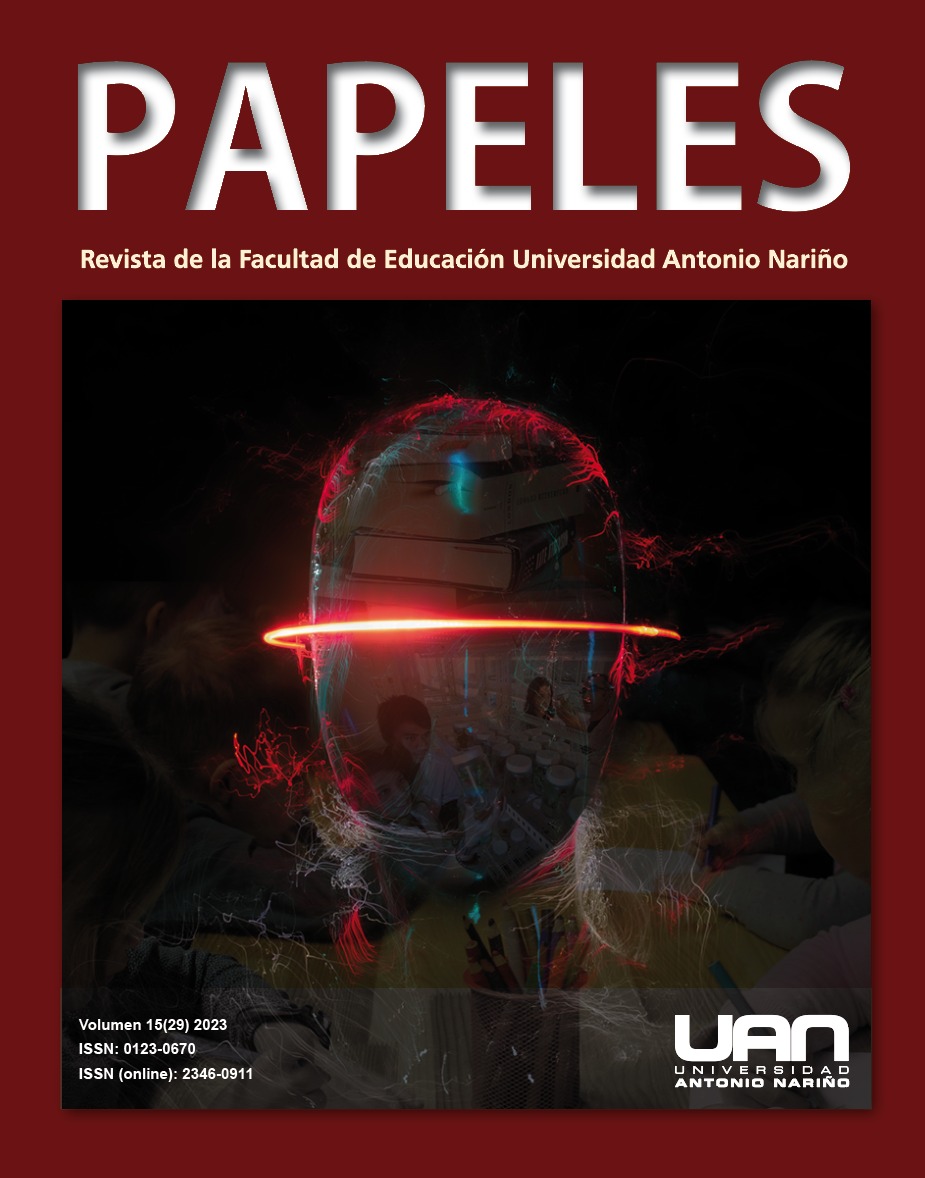Peer Tutoring: A Strategy to Help Future Teachers Know and Practice Basic Teaching Skills
La tutoría entre iguales: estrategia para que los futuros enseñantes conozcan y practiquen las funciones docentes básicas
DOI:
https://doi.org/10.54104/papeles.v15n29.1360Keywords:
Peer tutoring, teacher training, teaching practice, active learning, professional skillsAbstract
Introduction: This research was carried out with 24 students enrolled in the B.A. program in language teaching at the Benito Juárez University of Oaxaca, Mexico. The objective was to find out how peer tutoring, method characterized by the creation of pairs of students who teach each other an academic topic, could promote the development of basic teaching skills. To conduct the research, the students, firstly, received training on peer tutoring (TEI) and basic aspects of lesson planning. Then, 12 pairs of students (A and B) were formed following the principle of reciprocal peer tutoring. Methodology: Participant A (tutor), following the TEI criteria, prepared a curricular topic and taught it to his peer B (tutoree), who subsequently performed the same function (tutor B and tutoree A). In the research, a qualitative approach was used, and a focus group was employed to collect the data. All students were part of a focus group at the end of their session as tutors. In total, 12 focus groups of tutors each were realized, which were audio recorded. Results and Discussion: The data was reiteratively analyzed, generating the following emergent themes connected with peer tutoring and basic teaching functions: (i) knowing the content to be taught; (ii) elaborating didactic plans; and (iii) designing didactic material. The results indicated that peer tutoring is an effective strategy for teacher training, since during TEI practices, basic teaching activities such as planning and designing teaching materials are launched. Conclusions: This allows an effective teacher-training.
Downloads
References
Aguilera García, J. L. (2019). La tutoría universitaria como práctica docente: Fundamentos y métodos para el desarrollo de planes de acción tutorial en la universidad. Pro-Posições, 30, 2-27. https://doi.org/10.1590/1980-6248-2017-0038
Barbour, R. (2014). Los grupos de discusión en investigación cualitativa. Morata.
Baudrit, A. (2012). Interacción entre alumnos: Cuando la ayuda mutua enriquece el conocimiento. Narcea.
Biggs, J. (2004). Calidad del aprendizaje universitario. Narcea.
Cardozo Ortiz, C. E. (2011). Tutoría entre pares como estrategia pedagógica universitaria. Educación y Educadores, 14(2), 309-325. https://educacionyeducadores.unisabana.edu.co/index.php/eye/article/view/1926/2481
Díaz Barriga, F. y Hernández Rojas, G. (2010). Estrategias docentes para un aprendizaje significativo: Una interpretación constructivista. McGraw-Hill.
Duran Gisbert, D. (2014). Aprenseñar: Evidencias e implicaciones educativas de aprender enseñando. Narcea.
Duran Gisbert, D. y Flores Coll, M. (2015). Prácticas de tutoría entre iguales en universidades del Estado español y de Iberoamérica. REICE: Revista Iberoamericana sobre Calidad, Eficacia y Cambio en Educación, 13(1), 7-17. https://revistas.uam.es/reice/article/view/2796/3011Duran Gisbert, D. y Huerta Cordova, V. (2008). Una experiencia de tutoría entre iguales en la Universidad Mexicana de Oaxaca. Revista Iberoamericana de Educación, 48(1), 1-12. https://doi.org/10.35362/rie4812262
Duran Gisbert, D. y Vidal Iglesias, V. (2004). Tutoría entre iguales: De la teoría a la práctica. Un método de aprendizaje cooperativo para la diversidad en secundaria. Graó.
Duran Gisbert, D., Flores Coll, M., Oller, M. & Ramírez, M. (2018). Reading in pairs, description, and results of a peer tutoring program for English as a foreign language. Innovation in Language Learning and Teaching, 13(4), 303-317. https://doi.org/10.1080/17501229.2018.1462370
Fontanilla Lucena, N. (2021). Reflexiones de la experiencia docente como aprendizaje. Educere, 25(81), 657-667. https://www.redalyc.org/journal/356/35666225026/html/
Freire, P. (2013). Pedagogía del oprimido. Siglo XXI.
Hesse-Biber, S. N. (2017). The practice of qualitative research: Engaging students in the research process (3.ª ed.). Sage.
Huerta Cordova, V., López Gopar, M. E,, Sughrua, W. M. y Leon Jiménez, E. N. (2019). Migración de retorno y diversidad lingüística y cultural: La tutoría entre iguales como estrategia para su valoración. Muuch´xíimbal: Caminemos Juntos, 5(9), 93-118. https://doi.org/10.26457/mxcj.v0i9.2367
Kemmis, S. (2002). La teoría de la práctica educativa. En W. Carr, Una teoría para la educación: Hacia una investigación educativa crítica (pp. 17-38). Morata.
Kleyn, T. (2017). Centering transborder students: Perspectives on identity, languaging and schooling between the US and Mexico. Multicultural Perspectives, 19(2), 76-84. https://doi.org/ 10.1080/5210960.2017.1302336
La Prova, A. (2017). La práctica del aprendizaje cooperativo. Narcea.
Latorre Beltrán, A. (2015). La investigación acción: Conocer y cambiar la práctica educativa. Graó.
Londoño Orozco, G. y Cano García, E. (eds.) (2015). Formación y evaluación por competencias en educación superior. Universidad de La Salle.
Manrique Orozco, A. M. y Gallego Henao, A. M. (2013). El material didáctico para la construcción de aprendizajes significativos. Revista Colombiana de Ciencias Sociales, 4(1), 101-108. https://doi.org/10.21501/issn.2216-1201
Marcelo, C. y Vaillant, D. (2018). Desarrollo profesional docente: ¿Cómo se aprende a enseñar? Narcea.
Ovejero Bernal, A. (2018). Aprendizaje cooperativo crítico: Mucho más que una eficaz técnica pedagógica. Pirámide.
Packer, M. (2018). La ciencia de la investigación cualitativa (2.ª ed.). Universidad de los Andes.
Perrenoud, P. (2007). Diez nuevas competencias para enseñar. Graó.
Pierella, M. (2014). La autoridad en la universidad: Vínculos y experiencias entre estudiantes, profesores y saberes. Paidós.
Puig Rovira, J. y Martín, X. (2007). Competencia en autonomía e iniciativa personal. Alianza.
Rudduck, J. y Flutter, J. (2007). Cómo mejorar tu centro escolar dando la voz al alumnado. Morata.
Tobón Tobón, S., Pimienta Prieto, J. H. y García Fraile, J. A. (2010). Secuencias didácticas: Aprendizaje y evaluación de competencias. Pearson.
Tooping, K., Duran Gisbert, D. & Van Keer, H. (2016). Using peer tutoring to improve Reading skills: A practical guide for teachers. Routledge.
Vargas Murillo, G. (2017). Recursos educativos didácticos en el proceso enseñanza y aprendizaje. Cuadernos Hospital de Clínicas, 58(1), 68-74. http://www.scielo.org.bo/pdf/chc/v58n1/v58n1_a11.pdf
Vasilachis de Gialdino, I. (2019). La investigación cualitativa. En I. Vasilachis de Gialdino (coord.), Estrategias de investigación cualitativa (pp. 23-37). Gedisa.
Villagra Bravo, C. y Valdebenito Zambrano, V. (2019). Tutoría entre iguales como estrategia para la formación del profesorado. Magis: Revista Internacional de Investigación en Educación, 12(24),161-176. https://doi.org/10.11144/Javeriana.m12-24.tief
Zabalza, M. (2017). Competencias docentes del profesorado universitario. Narcea.
Downloads
Published
-
Abstract695
-
PDF (Español)316
How to Cite
Issue
Section
Categories
License
Copyright (c) 2022 Vilma Huerta Cordova

This work is licensed under a Creative Commons Attribution-NoDerivatives 4.0 International License.






